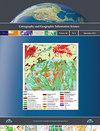DeepMapScaler:用于生成泛化地图的深度神经网络工作流
IF 2.6
3区 地球科学
Q1 GEOGRAPHY
Cartography and Geographic Information Science
Pub Date : 2023-10-26
DOI:10.1080/15230406.2023.2267419
引用次数: 0
摘要
摘要几十年来,地图综合自动化一直是一个重要的研究课题,但尚未完全解决。深度学习技术是为各种图像生成任务而设计的,因此有人可能会认为将这些技术应用于制图并训练端到端地图泛化的整体模型是可能的。相反,我们假设地图泛化是一项过于复杂的任务,无法用唯一的模型来学习。因此,在本文中,我们建议借鉴过去对地图泛化的研究,并将地图泛化分解为更简单的子任务,每个子任务都可以更容易地由深度神经网络解决。我们的主要贡献是深度模型的工作流程,称为DeepMapScaler,它可以从详细的地形数据中逐步实现地形图的概化。首先,我们实现了这个工作流程,从详细的数据集中泛化包含道路、建筑物和河流的中比例尺(1:50k)地形图。每个步骤的结果都进行了定量和可视化的评估。然后将综合后的图像与端到端地图综合整体模型和传统的半自动地图综合过程进行比较。实验表明,工作流方法比整体模型更有前景,因为每个子任务都是专门的,并且相应地进行了微调。然而,由于神经网络处理某些子任务更为复杂,结果仍未达到半自动传统地图概化过程的质量水平。关键词:地图泛化生成对抗网络深度学习工作流制图披露声明作者未报告潜在的利益冲突。数据可用性声明支持本研究结果的数据可在链接https://doi.org/10.5281/zenodo.7957430上获得。本文章由计算机程序翻译,如有差异,请以英文原文为准。
DeepMapScaler: a workflow of deep neural networks for the generation of generalised maps
ABSTRACTThe automation of map generalization has been an important research subject for decades but is not fully solved yet. Deep learning techniques are designed for various image generation tasks, so one may think that it would be possible to apply these techniques to cartography and train a holistic model for end-to-end map generalization. On the contrary, we assume that map generalization is a task too complex to be learnt with a unique model. Thus, in this article, we propose to resort to past research on map generalization and to separate map generalization into simpler sub-tasks, each of which can be more easily resolved by a deep neural network. Our main contribution is a workflow of deep models, called DeepMapScaler, which achieves a step-by-step topographic map generalization from detailed topographic data. First, we implement this workflow to generalize topographic maps containing roads, buildings, and rivers at a medium scale (1:50k) from a detailed dataset. The results of each step are quantitatively and visually evaluated. Then the generalized images are compared with the generalization performed using a holistic model for an end-to-end map generalization and a traditional semi-automatic map generalization process. The experiment shows that the workflow approach is more promising than the holistic model, as each sub-task is specialized and fine-tuned accordingly. However, the results still do not reach the quality level of the semi-automatic traditional map generalization process, as some sub-tasks are more complex to handle with neural networks.KEYWORDS: Map generalizationgenerative adversarial networkdeep learningworkflowcartography Disclosure statementNo potential conflict of interest was reported by the author(s).Data availability statementThe data that support the findings of this study are available at the link https://doi.org/10.5281/zenodo.7957430.
求助全文
通过发布文献求助,成功后即可免费获取论文全文。
去求助
来源期刊
CiteScore
5.20
自引率
20.00%
发文量
23
期刊介绍:
Cartography and Geographic Information Science (CaGIS) is the official publication of the Cartography and Geographic Information Society (CaGIS), a member organization of the American Congress on Surveying and Mapping (ACSM). The Cartography and Geographic Information Society supports research, education, and practices that improve the understanding, creation, analysis, and use of maps and geographic information. The society serves as a forum for the exchange of original concepts, techniques, approaches, and experiences by those who design, implement, and use geospatial technologies through the publication of authoritative articles and international papers.

 求助内容:
求助内容: 应助结果提醒方式:
应助结果提醒方式:


